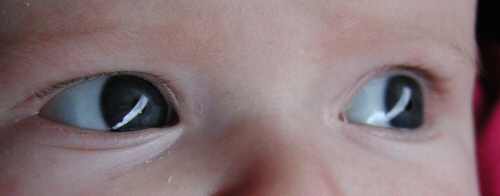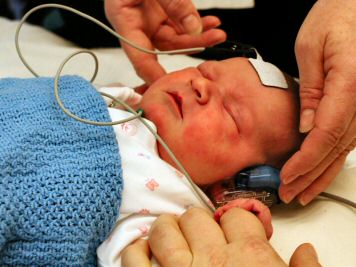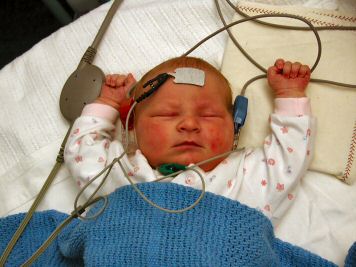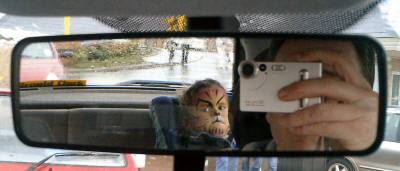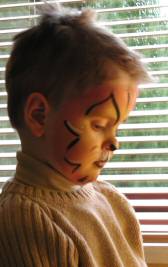Remember how I said we couldn’t figure out what colour Fiona’s eyes were? Well, now that she’s awake more, they seem to have matured into a beautiful deep blue.
The Kangaroo Song
When I put Alex to bed, I read him a story, then we turn out the light (he blows it out) and sing a few songs. My repertoire of kids’ songs is relatively limited, though, and Alex regularly asks for stuff I’ve never heard of.
“Have the…zoom zoom song!”
“What’s the zoom zoom song, Alex?”
“Zoom zoom song!”
“I don’t know that one. Can you sing it for me?”
“Zoom…zoom…zoom!”
Riiight. So, racking my brains for new material, a month or so ago I remembered the classic Rolf Harris song, “Tie me kangaroo down sport.” Or rather, I remembered the chorus, which goes:”
Tie me kangaroo down, sport,
Tie me kangaroo down.
Tie me kangaroo down, sport,
Tie me kangaroo down.
Rolf Harris, for those of you who didn’t grow up in the UK, is an Australian entertainer who has been hosting TV shows, making music, producing some fabulous art, and generally being an all round nice chap for over fifty years. “Tie me kangaroo down sport” was a hit in 1960, and has become one of those cultural points of reference in modern Britain, along with Rolf’s famous catch phrase, “Can you guess what it is yet?”
 Needless to say, Alex loved the catchy melody and sing-a-long-ness of the refrain. Despite me not knowing any more than those four lines, he insisted that I sing it over and over again. I liked having something new to sing, but I wished that I knew more of the lyrics. I could have used this new-fangled interweb thingie, of course, but by sheer coincidence I ran across a copy of “The Best Of Rolf Harris” in the line for the checkout at our local Sainsbury’s just a few days later. Bonzer!
Needless to say, Alex loved the catchy melody and sing-a-long-ness of the refrain. Despite me not knowing any more than those four lines, he insisted that I sing it over and over again. I liked having something new to sing, but I wished that I knew more of the lyrics. I could have used this new-fangled interweb thingie, of course, but by sheer coincidence I ran across a copy of “The Best Of Rolf Harris” in the line for the checkout at our local Sainsbury’s just a few days later. Bonzer!
Okay, so it’s not quite my usual listening material, but I bought it mainly for Alex, and he enjoys it. The Kangaroo Song is actually quite an amusing little ditty, and one I would recommend to any parent of small children. “Sun Arise,” which I used to think was irretrievably naff, I now find rather pretty and evocative. The last track on the CD is Rolf’s rendition of “Waltzing Matilda”, and he does an excellent job of that, too. The rest of the CD has its ups and downs, but on the whole it was five pounds well spent.
I was interested to find that I can’t listen to “Two Little Boys” without crying, though. It is regularly derided as one of the crappest songs in musical history, but it still gives me a lump in my throat and an ache in my heart. Call me sentimental, but I think it’s a beautiful expression of love, and of the fear of losing someone so close to you. I get the same way over Glen Phillips’s “Darkest Hour“. I can’t listen to it without tears, either.
Being a parent does mushy things to your head.
Fionaberry
I don’t know how long it will last, but Fiona is currently going by the nickname “Fionaberry”. She is small, round, and goes very red when she cries. So she’s a berry. (For evidence of her roundness, check out Abi’s description of Fiona’s crash weight gain programme. No steroids or protein drinks involved. Just home-grown milky goodness.)
She also looks very good in pink.
(Also, after two weeks we still can’t figure out if her eyes are dark blue, or brown. In sunlight there’s no doubt they’re blue, but under artificial light they are definitely brown. Very odd.)
Psi Testing, part 2
In case anyone was in doubt about the entry I wrote the other day about psi testing: it was a joke.
The Remillard Institute for Metapsychic Research does not exist, and “Milieu Theory” is a reference to Julian May’s Galactic Milieu and Pliocene novels. (The Many-Coloured Land, The Golden Torc, The Nonborn King, The Adversary, Intervention, Jack The Bodiless, Diamond Mask, and Magnificat) These novels deal with the emergence amongst humans of “metapsychic” powers: telepathy, psychokinesis, coercion, farseeing, redaction (mental healing), and creativity. Intervention is the linking book between the two series, and is set partly in Edinburgh. Hence the joke.
The photos of Fiona with electrodes strapped to her head are real, but I took them while she was having her hearing tested. Now this is very cool and 21st century: the audiologist stuck plastic headphones over her ears, and attached electrodes to her head. A computer played sounds of varying loudness and frequency through the headphones, and then the electrodes measured her brain’s response to the sounds. It’s a more sophisticated version of ringing a bell and watching to see if the baby twitches.
And yes, Fiona’s hearing seems to be just fine.
Interestingly, Edinburgh University actually has a real department of parapsychology, where they perform genuine, serious research into psychic abilities and phenomena.
Psi Testing
When babies are born, they undergo all sorts of tests to make sure they’re fit and healthy. There’s the standard APGAR test, which checks for Activity, Pulse, Grimace, Appearance, and Respiration. Then there are blood tests to check for a variety of syndromes that can’t be detected during pregnancy. All throughout the first two days, the baby is weighed, measured, poked and prodded, and passed from doctor to consultant to specialist to midwife dozens of times.
The most interesting test Fiona had, though, was an optional one: psi testing. Not everyone wants it, and it’s certainly beyond the scope of the NHS to provide it for all parents. However, the Remillard Institute (a privately funded Canadian research body) is currently sponsoring a trial programme at the Edinburgh Royal Infirmary, and we were offered the opportunity to take part.
It was all very sophisticated. Dr. MacDonald, the pediatric parapsychologist, attached a set of sensors to Fiona’s head, neck, and throat, and hooked her up to a so-called “cerebro-inductive rig.” The rig stimulated Fiona’s brain directly, and measured the response immediately. Her results showed no reaction for for Psychokinesis or Farseeing, but strong potential for Creativity, Redaction, and particularly Coercion. Cool!
I hadn’t realised that the field of pediatric parapsychology was so far advanced. We chatted to Dr. MacDonald about psi and Milieu Theory for a while afterwards, and she explained how the cerebro-inductive rig is only a very recent development. Until just a few years ago researchers couldn’t test babies or young children, because they had to rely on spoken, facial and physical reactions from the subjects themselves. Babies are obviously not capable of giving that kind of feedback.
It turns out the trial programme at ERI still has another three weeks to run, so we’ve set up an appointment to get Alex tested as well. It’s not something we need to do (we’ve already found out the hard way that he’s high-Coercion), but it’ll be interesting to find out if he has the same combination of psi abilities as Fiona, or if he’s likely to wreck the house with emergent PK when he hits adolescence.
